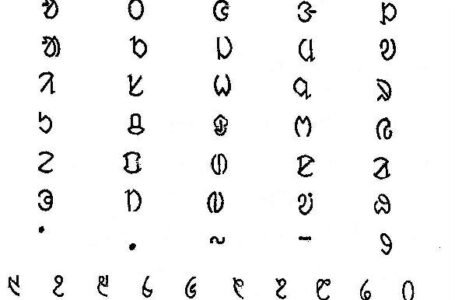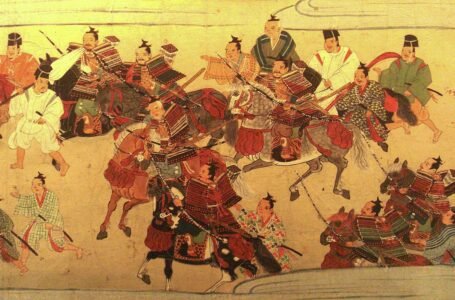Hindu Mythology’s Impact on Indian Tattoos: Spiritual and Cultural Significance

The Influence of Hindu Mythology on Indian Tattoos: Discuss the incorporation of Hindu deities, symbols, and mythological narratives in traditional Indian tattoo designs, showcasing their spiritual and cultural significance:
People have used tattoos as a means of artistic expression for a very long time to reflect their cultural identity, values, and experiences. In India, a nation with many different customs and a rich history, tattoos have a special meaning that is frequently derived from the country’s ancient mythology. Hindu mythology, a source of enthralling tales and rich symbolism, has had a major influence on the development of conventional Indian tattoo designs. This article looks into the fascinating world of Indian tattoos and examines how Hindu gods, symbols, and legendary tales find a home in these elaborate patterns, bearing both spiritual and cultural significance.
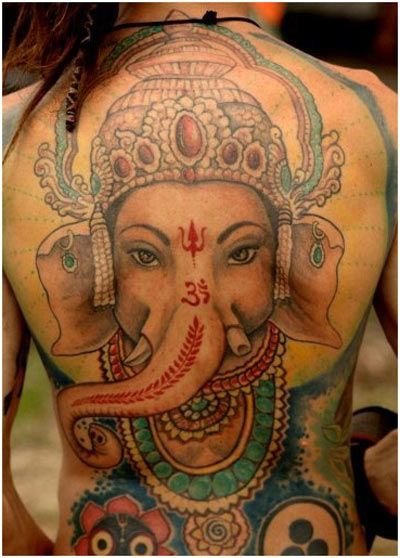
Hindu Deities: Reflections of the Divine:
One of the oldest faiths in the world, Hinduism, has a large pantheon of deities, each of whom stands for different qualities and facets of life. These gods have long served as the focal point of Indian tattoos, where their likenesses are painstakingly inked onto the flesh as a sign of devotion and defense. In Indian tattoo art, Lord Ganesha, the elephant-headed deity of learning and fresh beginnings, is a well-liked design. His likeness stands for the lifting of barriers and the beginning of new travels. Before making major life changes, like getting married or changing careers, many people decide to get tattoos of Ganesha to ask for his blessings for a smooth transition.
Another beloved tattoo design is the tranquil and kind face of Goddess Lakshmi, who represents abundance and prosperity. She is said to bring monetary and spiritual richness into the life of the bearer and act as a continual reminder of the values she exemplifies. As a symbol of metamorphosis and change, Shiva, the god of creation and destruction, has a place in tattoo art. His third eye and the crescent moon in his hair are well-known symbols with profound spiritual meaning that are frequently adorned on the bodies of those who are interested in spiritual development and inner study.
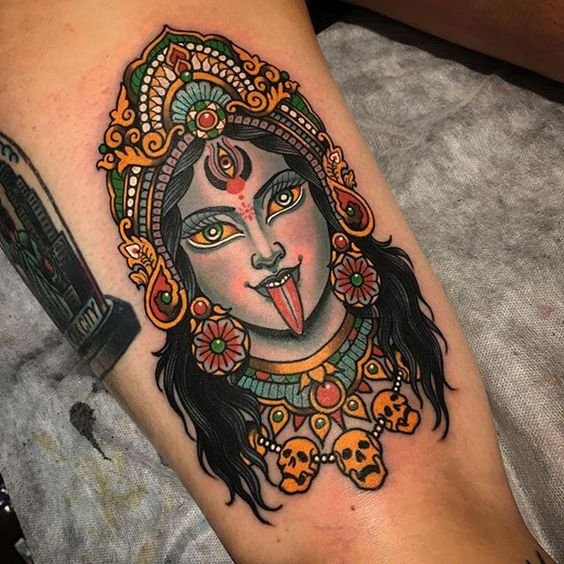
Windows to the Divine: Symbols
Symbols have a crucial role in Hindu mythology in addition to gods, and they are regularly used in traditional Indian tattoo designs. These symbols represent profound ideas and capture the core of spiritual convictions. Indian tattoos frequently use the Om symbol, a revered word in Hinduism that stands for ultimate reality and the cosmic sound. It offers a profound link to the cosmos with its curves and lines symbolizing the cycle of creation, preservation, and disintegration. Many people decide to tattoo the Om sign on their bodies as a means to connect with higher awareness and take calmness with them throughout the day.
Another symbolic image is the lotus flower, which emerges elegantly from the gloomy depths. It is a popular option among individuals looking to further their spiritual lives due to its associations with purity and enlightenment. The lotus is a profound metaphor for change because its opening petals represent the soul’s path to self-realization.
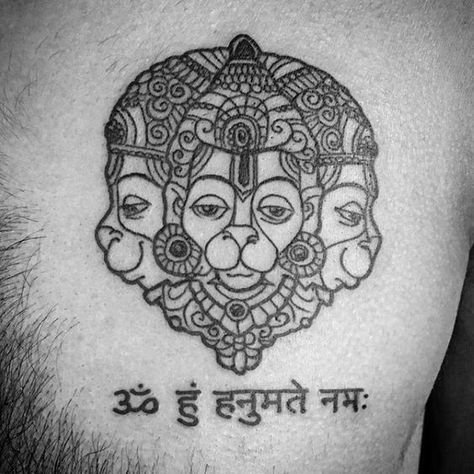
Mythological Tales: Skin-Related Tales
Hindu mythology is a rich source of enthralling stories that provide light on the nature of reality, the universe, and the divine. These legendary stories frequently end up on the canvas of skin, giving beloved stories a visual expression. For Indian tattoo artists, the epic Ramayana, which describes the valiant actions of Lord Rama and his devoted followers, serves as a common source of inspiration. Scenes from this tale are etched in ink as a testament to bravery, loyalty, and righteousness. Examples include the triumphant killing of the demon king Ravana or the unwavering devotion of Hanuman. Another well-known person whose tales are inked on people’s bodies is Krishna, the mischievous and endearing celestial hero of the Mahabharata. Krishna’s flute playing and lively interactions with the gopis are shown with a feeling of pleasure, love, and unlimited vitality.
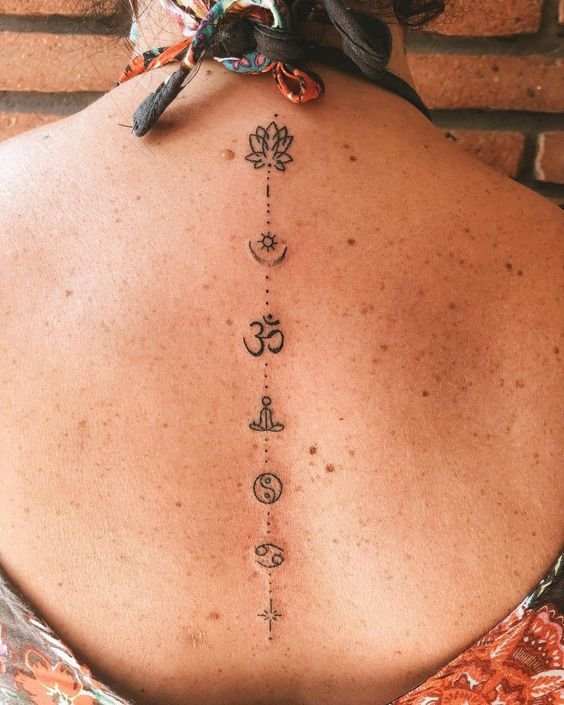
Cultural Persistence and Modern Expression:
More than just a fashion, Hindu deities, symbols, and legendary tales included in Indian tattoos are a potent statement of spirituality and cultural continuity. These tattoos provide a concrete link to India’s old traditions in a contemporary setting, acting as a bridge between the past and the present. Additionally, Hindu-inspired Indian tattoos are not just found in India. They have captivated people all over the world who are drawn to the depth of Hindu mythology and its artistic manifestations, transcending boundaries and cultural barriers. People from many origins may connect with a legacy that embodies ideals such as love, wisdom, and inner development by tattooing these designs.
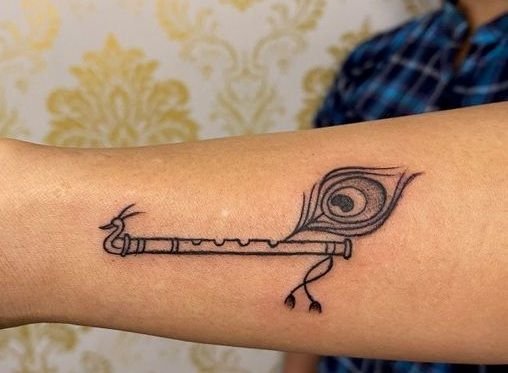
Tradition Preservation Through Ink:
Traditional artistic and cultural activities occasionally run the risk of disappearing as modernity forges ahead. However, Hindu mythology-infused Indian tattoos are a great example of how tradition endures. The tattoo artists who specialize in these designs serve as cultural heritage keepers, ensuring that old tales and symbols are passed down through the generations in fresh and intriguing ways.

Conclusion:
In conclusion, Over the years, tattooing has developed into an art form, progressing from basic identifying symbols to sophisticated works of art that express a person’s hopes and ideals. The combination of Hindu mythology and tattoo art in India has produced a spiritual tapestry that speaks to both the wearer and the onlooker. Each tattoo conveys a message of devotion, protection, and cultural heritage, whether it be a representation of a helpful god, a holy symbol, or a legendary setting. Hindu mythology continues to inspire and unite people throughout time and space, and the fact that this ancient art form is thriving and evolving is proof of this. Indian tattoos are incredibly expressive of cultural identity, spirituality, and creative genius in the body art world. Hindu gods, symbols, and legendary tales are infused into these designs to create a compelling story that speaks to people on both a personal and a collective level. Each time a tattoo artist uses their needle, they are embarking on a spiritual journey that combines timeless knowledge with modern self-expression. These tattoos are a monument to Hindu mythology’s continuing ability to uplift, unite, and enlighten the human experience as they decorate bodies all across the world.
